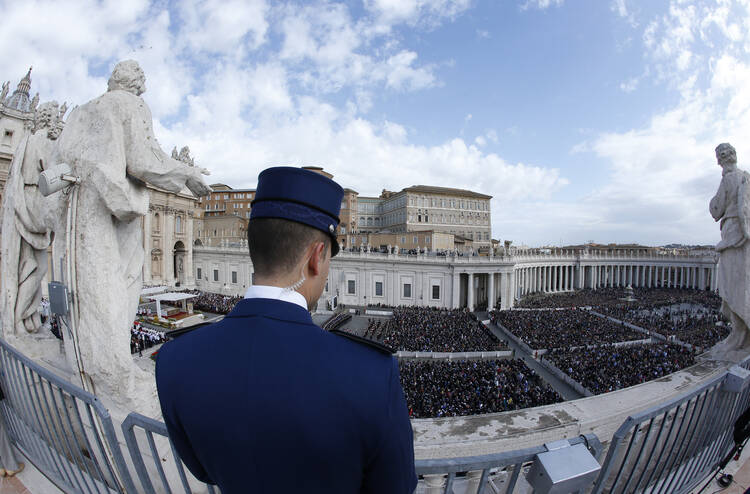The Vatican Gendarmerie has arrested Msgr. Carlo Cappella, a Holy See diplomat who served in the nunciature in Washington, D. C., on child pornography charges on April 7, following the issuance of an arrest warrant by the Promoter of Justice, the investigating magistrate of the Vatican City State Tribunal. If convicted, the priest could be sent to prison for up to five years and be fined.
The Holy See Press Office broke the news in a press communique this afternoon, saying, “The accused is being detained in a cell in the barracks of the Gendarmerie Corps, available to the judicial authorities.”
The warrant was issued on “on the basis of Article 10, paragraphs 3 and 5, of Law N.VIII of 2013,” part of the revised Vatican City State penal code promulgated by Pope Francis. This revision of the penal code included penalties for crimes related to child pornography under the Vatican’s criminal law, matching a 2010 revision of canon law made by Benedict XVI.
Monsignor Capella was caught up in 2016 in a three-nation investigation into child porn. Police in Windsor, Ontario, alleged that the monsignor uploaded child pornography from a social networking site while visiting a place of worship from Dec. 24-27, 2016. Last September, the Vatican announced that its Promoter of Justice had opened an investigation into a possible violation of U.S. laws relating to child pornography by a Holy See diplomat who was in service in the nunciature (Vatican embassy) in Washington, D.C. It did not identify Monsignor Cappella at that time, but news media quickly did so.
In a statement issued to the media then, the Vatican press office revealed that “on August 21 last, the Department of State of the United States of America notified the Secretariat of State, through diplomatic channels, of a possible violation of laws relating to child pornography images by a member of the diplomatic corps of the Holy See accredited to Washington.”
It said that “the Holy See, following the practice of sovereign states, recalled the priest in question, who is currently in Vatican City.”
After the Vatican Secretariat of State had referred the matter for investigation, the statement said: “The Promoter of Justice opened an investigation and has already commenced international collaboration to obtain elements relative to the case.” In other words, the Vatican and the U.S. authorities were collaborating on the investigation of the case.
A Vatican legal expert told America that as a cleric the priest could also be subject to a judicial process conducted by the Congregation for the Doctrine of the Faith relating to “the most serious delicts,” which Benedict XVI had revised and updated in 2010 to include child pornography along with sexual abuse of children. In addition to the outcome of the criminal charges, penalties under a possible C.D.F. process could include dismissal from the clerical state.
With AP reporting.









